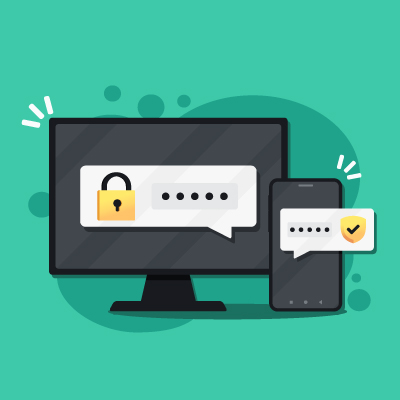Unfortunately, the number of cyberattacks is consistently growing and many of those attacks target business end users. This means that any account that requires a password for access could conceivably be compromised should attackers gain access to its credentials.
What Are the Best MFA Practices?
To protect against these threats, businesses must adopt intuitive security strategies to secure user accounts. Multi-factor authentication (MFA) or two-factor authentication (2FA) is one of the most effective methods to enhance account security. MFA adds an additional layer of security by requiring users to verify their identity in more than one way. This approach addresses the vulnerabilities of the traditional login method, such as phishing attacks, brute force attacks, and other advanced hacking techniques that can compromise credentials.
However, MFA mitigates these risks by requiring another form of authentication. Best practices for implementing MFA include ensuring it is enabled across all critical accounts, regularly updating the authentication methods, and educating users on safe practices. These are things that Network Innovation Solutions does on behalf of all our Managed Service Customers
Understanding Authentication and How MFA Works
Authentication is the process of verifying the identity of a user or system. It ensures that the person or entity requesting access is who they claim to be. MFA works by combining two or more of the following factors to verify identity:
- Something you know, such as a password or PIN.
- Something you have, like a hardware token, mobile device, or secure 2FA key.
- Something you are, including biometric data like fingerprints or facial recognition.
By distributing the authentication process across multiple factors, MFA significantly reduces the likelihood of unauthorized access.
Hardware Tokens and the Most Secure 2FA Keys
Hardware tokens and secure 2FA keys are essential for organizations looking to implement the most secure form of MFA, or ones that don't want their employees using personal devices for business use. Unlike soft tokens, such as mobile apps, hardware tokens operate independently of personal devices, reducing the risks associated with compromised smartphones or SIM-swapping attacks.
That is why we recommend Cisco Duo, which offers hardware tokens that can be used across multiple platforms, ensuring seamless authentication for email, remote desktops, and other critical applications. They are also some of the most secure 2FA keys because they are FIDO2-compliant and provide robust encryption, making them resistant to phishing and man-in-the-middle attacks.
MFA for Office 365
Microsoft recently announced significant changes to email security by requiring MFA authentication for Office 365. Beginning in early 2025, MFA will be mandatory for all Office 365 accounts, and we predict that this will soon be something all companies implement in the near future. So, contact us today and learn why NIS recommends Cisco Duo as it is one of the most secure, robust, and easiest-to-use MFA platforms currently on the market.
Let’s Improve Your Business’ Security Together!

